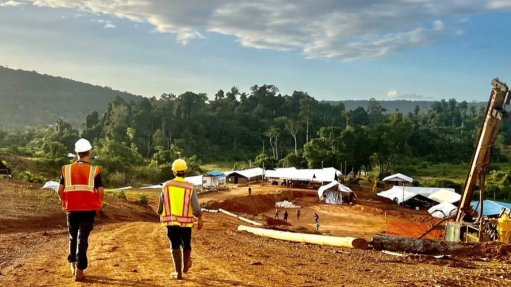Three-year programme to tackle siltation of State-owned dams launched
The Water Research Commission (WRC) is embarking on an ambitious programme to ensure the effective siltation management of 320 State-owned, Department of Water and Sanitation- (DWS-) managed large dams, in an effort to improve the storage capacity of the dams.
The three-year National Dam Siltation Management Strategy, or NatSilt, project was launched during a two-day virtual WRC NatSilt Symposium from May 19 to 20, after the WRC was appointed by the DWS to manage and implement the project.
Funded by the DWS, the programme’s overarching aim is to develop and pilot a strategy that will guide, advise and ensure effective siltation management and related improved storage capacity for dams.
The programme sets out to address the reservoir storage losses experienced as a result of dam siltation and the accumulation of sediments owing to soil erosion.
In the last year, some of the country’s dams have experienced up to 90% sedimentation, with storage capacity losses ranging between 10% and 30%.
The WRC will be developing a package of siltation management solutions, including the relevant tools, models, frameworks, protocols, guides and plans to assist with the implementation and monitoring of the strategy.
This will assist the DWS in sustaining supply to domestic, industrial, strategic and agricultural bulk water users, as well as save scarce financial resources by extending the life cycle of existing dams.
“It is a high technology and expensive option in many cases and we have to be quite ingenious around how we are going to tackle it,” says WRC CEO Dhesigen Naidoo.
To meet the mandate, the WRC will need to invest in the right kind of research development, combined with a lot of innovation.
“We have to develop a much higher level of capacity and new capability inside the system in order to do it.
“We need to operate in a way that helps us to grow jobs, entrepreneurs and businesses so that it directly contributes to the economic model in the system, and, through that, ensure the integrity of the infrastructure as we go along.”
The programme will result in the development of a dam basin siltation management operations model, a sustainable dredging business model, a dam basin classification decision-making tool, capacity building, a step-by-step comprehensive implementation plan and the piloting of the draft strategy, models and tools.
Phase 1 comprises research, assessments and the development of a siltation management strategy and related tools for large dams, while the piloting of various models, concepts and the tools will be undertaken in Phase 2.
A review and revision towards a final strategy, with relevant models and tools, will be completed in the final third phase.
The pilot plan will potentially be rolled out in three government water schemes, namely Welbedacht dam in the Free State; Hazelmere dam in KwaZulu-Natal; and Darlington dam/Orange-Fish GWS in the Eastern Cape.
The programme has four subprojects that will be integrated and managed as one programme to meet the desired objectives.
The strategy development subproject comprises a situational analysis, the engagement of a broad range of stakeholders, mapping of the drivers and challenges linked to potential solutions and the provision of an up-to-date state of dam siltation management in South Africa.
The development of the relevant tools, models, frameworks, protocols, guides and plans will assist in the implementation and monitoring of the strategy.
Under a subproject called ‘dam engineering and socioecological systems’, the team will generate and test tools that will enable the alleviation of dam siltation through optimised catchment management as well as dam engineering methodologies and innovations.
The ‘sustainable dredging of dams’ subproject recognises the importance of dredging and will work to develop sustainable, cost-effective dam dredging models and protocols for a variety of ‘learning’ dams and contexts.
Priority sites will be identified through a consultative process to capture areas requiring intervention that are representative of a larger set of dams.
The programme will also have a training and capacity development component to develop a new cohort of skilled professionals and citizens to enhance and improve the efficiency of dam siltation management.
Comments
Press Office
Announcements
What's On
Subscribe to improve your user experience...
Option 1 (equivalent of R125 a month):
Receive a weekly copy of Creamer Media's Engineering News & Mining Weekly magazine
(print copy for those in South Africa and e-magazine for those outside of South Africa)
Receive daily email newsletters
Access to full search results
Access archive of magazine back copies
Access to Projects in Progress
Access to ONE Research Report of your choice in PDF format
Option 2 (equivalent of R375 a month):
All benefits from Option 1
PLUS
Access to Creamer Media's Research Channel Africa for ALL Research Reports, in PDF format, on various industrial and mining sectors
including Electricity; Water; Energy Transition; Hydrogen; Roads, Rail and Ports; Coal; Gold; Platinum; Battery Metals; etc.
Already a subscriber?
Forgotten your password?
Receive weekly copy of Creamer Media's Engineering News & Mining Weekly magazine (print copy for those in South Africa and e-magazine for those outside of South Africa)
➕
Recieve daily email newsletters
➕
Access to full search results
➕
Access archive of magazine back copies
➕
Access to Projects in Progress
➕
Access to ONE Research Report of your choice in PDF format
RESEARCH CHANNEL AFRICA
R4500 (equivalent of R375 a month)
SUBSCRIBEAll benefits from Option 1
➕
Access to Creamer Media's Research Channel Africa for ALL Research Reports on various industrial and mining sectors, in PDF format, including on:
Electricity
➕
Water
➕
Energy Transition
➕
Hydrogen
➕
Roads, Rail and Ports
➕
Coal
➕
Gold
➕
Platinum
➕
Battery Metals
➕
etc.
Receive all benefits from Option 1 or Option 2 delivered to numerous people at your company
➕
Multiple User names and Passwords for simultaneous log-ins
➕
Intranet integration access to all in your organisation

















